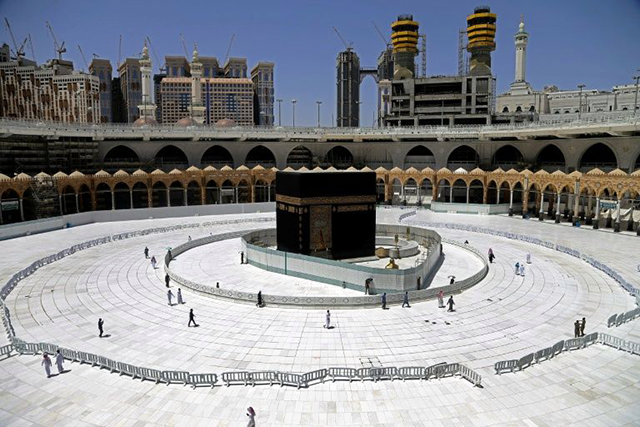- International News
- Tue-2020-04-21 | 03:55 pm

Ramadan is a period for both self-reflection and socialising. Believers fast from dawn to dusk and then gather around a family or community meal each evening of Islam's holiest month, which begins later this week and ends with Eid Al Fitr festivities.
But this year, the fast-spreading novel coronavirus threatens to dampen Ramadan like never before, with millions locked down across the Middle East -- from Saudi Arabia and Lebanon to the battle zones of Libya, Iraq and Yemen.
More dispiriting for many devout Muslims is the banning of congregational worship, including taraweeh nighttime prayers, in mosques across the region, with many closed in a bid to slow the spread of the virus.
Several countries' religious authorities, including Saudi Arabia's Grand Mufti Abdulaziz Al Sheikh, have ruled that prayers during Ramadan and Eid be performed at home.
"Our hearts are crying," said Ali Mulla, the muezzin who gives the call to prayer at Mecca's Grand Mosque.
"We are used to seeing the holy mosque crowded with people during the day, night, all the time... I feel pain deep inside."
In recent weeks, a stunning emptiness has enveloped the sacred Kaaba -- a large black cube structure draped in gold-embroidered cloth in the Grand Mosque towards which Muslims around the world pray.
The white-tiled area around the Kaaba is usually packed with tens of thousands of pilgrims.
Ramadan is considered an auspicious period to perform the year-round Umrah pilgrimage, which Saudi authorities suspended last month.
It is likely the larger Hajj pilgrimage, set for the end of July, will also be cancelled for the first time in modern history after Saudi Arabia urged Muslims to temporarily defer preparations.
'No feasts, no visits'
The Grand Mufti of Jerusalem and the Palestinian Territories Muhammad Hussein has announced similar prayer restrictions during Ramadan, while also advising against the public sighting of the crescent moon, which is used to estimate the start of the holy month.
The restrictions are in line with the recommendations of the World Health Organisation, which has urged countries to "stop large numbers of people gathering in places associated with Ramadan activities, such as entertainment venues, markets and shops".
The restrictions have hit businesses hard, including retailers who would normally be preparing for the Ramadan rush.
This year many Muslims are saving their money for masks, gloves and other COVID-19 protective gear.
"I had saved up an amount to spend on Ramadan shopping, but I spent it instead on purchasing things needed for quarantine and protection against the virus," said Younes, 51, who works at a clothing store in the Syrian capital Damascus.
"This year, no feasts, no visits... I feel we are besieged by the virus wherever we go."
Sanctions-stricken Iran last week allowed some shuttered Tehran businesses to reopen, despite being one of the worst-hit countries in the Middle East, as many citizens braved possible infection to avoid economic ruin.
Official statistics show the disease has killed more than 5,000 people and infected over 80,000 in Iran, but the actual figures are thought to be higher.
Supreme leader Ayatollah Ali Khamenei has appealed to Iranians to pray at home during Ramadan, while urging them to "not neglect worship, invocation and humility in our loneliness".
There is some levity in Cairo, where the Egyptian capital's narrow alleys and downtown markets are still covered with traditional Ramadan decorations and brightly coloured lanterns known as fawanees.
These decorations also typically adorn restaurants and cafes, but they are all closed due to the outbreak, lending a more subdued feel to the city as the holy month approaches.
Prayers and charity
Hardliners across the region have rejected some online suggestions by Muslims that they should be exempt from fasting this year owing to the pandemic, insisting that while social distancing was necessary, the virus did not stop them from observing the rules of Ramadan from home.
The WHO has pointed out that no studies have looked into links between studies of fasting and risk of COVID-19 infection.
"Healthy people should be able to fast during this Ramadan as in previous years, while COVID-19 patients may consider religious licenses regarding breaking the fast in consultation with their doctors, as they would do with any other disease," it said.
Iran's Khamenei issued a fatwa on Saturday allowing patients not to fast during Ramadan if a "pious doctor" considers it a risk, and to defer their fasting to a later date.
His ruling falls in line with long-standing Islamic traditions.
For many trapped in their homes in war-battered countries such as Libya, Ramadan is still a time for prayer, introspection and charity.
"For me, Ramadan has come early this year. During these curfew times, it means fewer working hours, similar to Ramadan," said Karima Munir, a 54-year-old banker and mother of two in Libya.
"Ramadan is always about being charitable and this year the needy are numerous, especially with the [displacement] from the war












